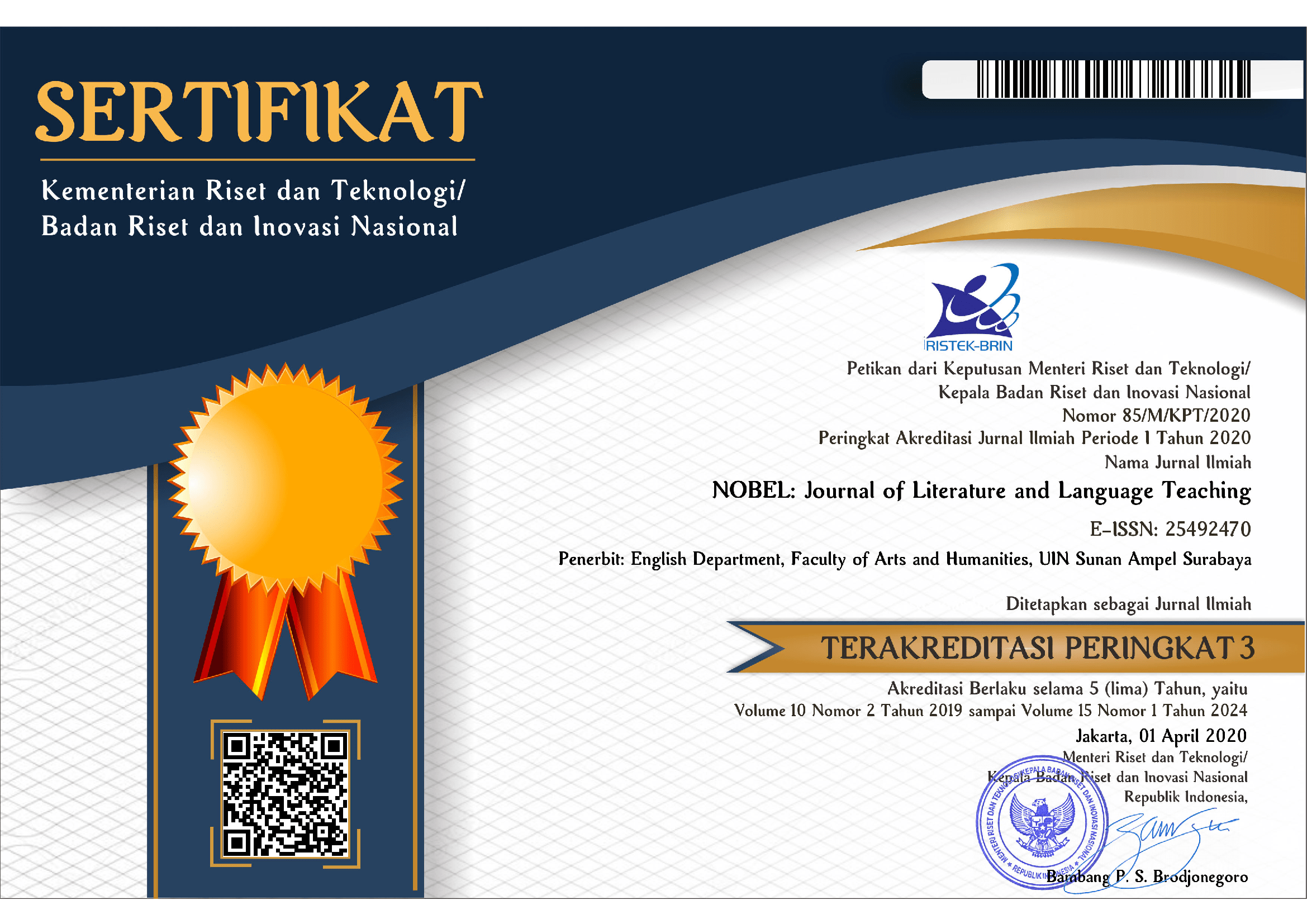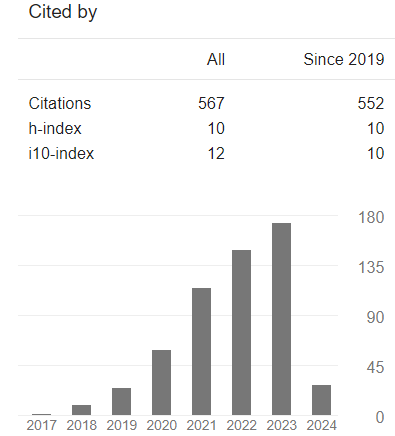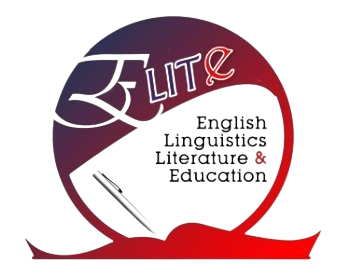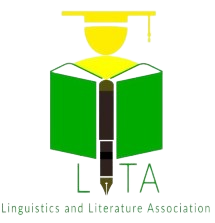The Difficulty Level of Online Learning in The Remote Areas during The New Normal Period
DOI:
https://doi.org/10.15642/NOBEL.2023.14.1.102-114Keywords:
difficulty level, online learning, Google ClassroomAbstract
Online learning still occurs in many places during the New Normal, along with limited face-to-face learning. However, offline learning in several regions had to be withdrawn because of the new version of the coronavirus. One platform of online learning that is often used is Google Classroom. This study aims to determine the difficulty level of online learning with Google Classroom in STKIP Pamane Talino students in the new normal period. To reach the aim of the study, the researchers used a qualitative descriptive method. Fifty-nine students in the Extensive Reading class of second-semester students of the English Education Study Program, STKIP Pamane Talino, were selected to participate in this study. The data analysis technique used in this study was critical analysis. The data were collected through observation and interviews. The questionnaire results showed that 73% of the respondents agreed with the ease of using the Google Classroom application in online learning, which can be categorized as good. From the result above, it can be suggested that online learning using Google Classroom is one of the alternative ways to online learning in remote areas during the new normal period.
Downloads
References
Asiyai, R. (2012). Assessing school facilities in public secondary schools in Delta State, Nigeria. African Research Review, 6(2), 192–205. https://doi.org/10.4314/afrrev.v6i2.17
Boeskens, L., Nusche, D., & Yurita, M. (2020). Policies to support teachers’ continuing professional learning: A conceptual framework and mapping of OECD data (No. 235; OECD Education Working Paper). https://doi.org/10.1787/247b7c4d-en
Darmawan, D. (2014). Metode penelitian kualitatif dan kuatitatif. PT Remaja Rosdakarya.
Drajati, N. A., Rakerda, H., Sulistyawati, H., Nurkamto, J., & Ilmi, M. (2021). Investigating the adoption of TPACK-21CL by English pre-service teachers in a COVID-19 teaching practicum. Indonesian Journal of Applied Linguistics, 11(1), 124–133. https://doi.org/10.17509/IJAL.V11I1.34625
Ellitan, L. (2020). Competing in the era of industrial revolution 4.0 and society 5.0. Jurnal Maksipreneur: Manajemen, Koperasi, Dan Entrepreneurship, 10(1), 1–12. https://doi.org/10.30588/JMP.V10I1.657
Gladilina, I., Pankova, L., Sergeeva, S., Bulochnikova, N., & Baldin, S. (2020). Learning management system: Integration models of conventional and distance education of students. EurAsian Journal of Biosciences, 14(2), 6153–6159. https://web.p.ebscohost.com/abstract?direct=true&profile=ehost&scope=site&authtype=crawler&jrnl=13079867&AN=148907448&h=ua7xqCjfilJk4dQr%2Bp0jPiWq7DntoncItu7UUqT1grS4T6xWwmYBpJEh8GdPV417YVNZVpe3xFJMPv7AS%2Fgjlw%3D%3D&crl=c&resultNs=AdminWebAuth&resultLoca
Hanifah, W., & Putri, K. Y. S. (2020). Efektivitas komunikasi Google Classroom sebagai media pembelajaran jarak jauh pada mahasiswa Ilmu Komunikai Universitas Negeri Jakarta angkatan 2018. MEDIALOG: Jurnal Ilmu Komunikasi, 3(2), 24–35. https://doi.org/10.35326/MEDIALOG.V3I2.639
Hapsari, S. A., & Pamungkas, H. (2019). Pemanfaatan Google Classroom sebagai media pembelajaran online di Universitas Dian Nuswantoro. WACANA: Jurnal Ilmiah Ilmu Komunikasi, 18(2), 225–233. https://doi.org/10.32509/wacana.v18i2.924
Kholisdinuka, A. (2021). Dari 74.961 desa di RI, 2.275 di antaranya belum teraliri listrik. DetikNews. https://news.detik.com/berita/d-5827761/dari-74961-desa-di-ri-2275-di-antaranya-belum-teraliri-listrik
Liputan6.com. (2021). Solusi jaringan internet untuk siswa dan warga di daerah terpencil. Liputan6.Com. https://www.liputan6.com/lifestyle/read/4682362/solusi-jaringan-internet-untuk-siswa-dan-warga-di-daerah-terpencil
Maharani, N., & Kartini, K. S. (2019). Penggunaan Google Classroom sebagai pengembangan kelas virtual dalam keterampilan pemecahan masalah topik kinematika pada mahasiswa jurusan Sistem Komputer. PENDIPA Journal of Science Education, 3(3), 167–173. https://doi.org/10.33369/PENDIPA.3.3.167-173
Mahardini, M. M. A. (2020). Analisis situasi penggunaan Google Classroom pada pembelajaran daring Fisika. Jurnal Pendidikan Fisika, 8(2), 215–224. https://doi.org/10.24127/JPF.V8I2.3102
Mazda, C. N., & Fikria, A. N. (2021). Analisis efektifitas Google Classroom, Zoom Meeting dan Google Meet sebagai multimedia interaktif pembelajaran online. INISTA (Journal of Informatics Information System Software Engineering and Applications), 3(2), 1–9. https://doi.org/10.20895/INISTA.V3I2.242
Nainggolan, A. P., & Manalu, R. B. B. (2021). Pengaruh penggunaan Google Classroom terhadap efektifitas pembelajaran. Journal Coaching Education Sports, 2(1), 17–30. https://doi.org/10.31599/JCES.V2I1.515
Sa’diyah, H., Hastuti, A. F., & Wibowo, H. P. (2021). Efektifitas Google Classroom dalam pengelolaan pembelajaran masa pandemi di SMA Negeri 1 Wonosari. Buletin Literasi Budaya Sekolah, 3(1), 1–12. https://doi.org/10.23917/BLBS.V3I1.13893
Suhada, I., Kurniati, T., Pramadi, A., & Listiawati, M. (2020). Pembelajaran daring berbasis Google Classroom mahasiswa pendidikan biologi pada masa wabah Covid-19. https://digilib.uinsgd.ac.id/30584/
Suryabrata, S. (2003). Metodologi penelitian. PT Raja Grafindo Persada.
Syakur, A., Faradisy, R., & Surahman, F. (2020). Peningkatan minat belajar bahasa Inggris di akademi kebidanan Graha Husada melalui aplikasi Google Class Room pada masa pandemi Covid-19. Jurnal Pengabdian Dan Pemberdayaan Nusantara (JPPNu), 2(1), 88–95. http://journal.unublitar.ac.id/jppnu/index.php/jppnu/article/view/17
Tuminah, Faridha, N., & Sihombing, I. P. T. (2021). The effect of online learning using Google Classroom on students’ achievement in remote areas. The Language Teacher Training and Education (LTTE) International Conference, 306–316. http://eprints.unm.ac.id/21253/1/39. 2021-03 LTTE PROCEEDING %28Syarifuddin Dollah%2C Fauzan Hari Sudding%2C Geminastiti Sakkir%29.pdf
Umairah, P., & Zulfah. (2020). Peningkatan motivasi belajar menggunakan Google Classroom ditengah pandemi Covid-19 pada peserta didik kelas XI IPS 4 SMAN 1 Bangkinang Kota. Journal on Education, 2(3), 275–285. https://doi.org/10.31004/JOE.V2I3.319
Utami, R. (2019). Analisis respon mahasiswa terhadap penggunaan Google Classroom pada mata kuliah Psikologi Pembelajaran Matematika. PRISMA, Prosiding Seminar Nasional Matematika, 2(2019), 498–502. https://journal.unnes.ac.id/sju/index.php/prisma/article/view/29040
Wicaksono, V. D., & Rachmadyanti, P. (2017). Pembelajaran blended learning melalui Google Classroom di sekolah dasar. Seminar Nasional Pendidikan PGSD UMS & HDPGSDI Wilayah Jawa, 522–535. http://publikasiilmiah.ums.ac.id/handle/11617/9144
Wiguna, M. Z. (2022). Survei tingkat kesukaran pembelajaran daring Whatsapp mahasiswa IKIP PGRI Pontianak di masa Covid-19. Proceedings of the International Conference on Literacy and Education, 2(1), 92–100. http://jurnal.pbing.org/index.php/icoled/article/view/4
Wisman, & Kurniawan, R. (2020). Pengembangan media pembelajaran keterampilan menyimak berbasis online menggunakan Google Form dan Google Classroom. Silampari Bisa: Jurnal Penelitian Pendidikan Bahasa Indonesia, Daerah, Dan Asing, 3(2), 289–309. https://doi.org/10.31540/SILAMPARIBISA.V3I2.1066
Downloads
Published
How to Cite
Issue
Section
License
Copyright (c) 2023 NOBEL: Journal of Literature and Language Teaching

This work is licensed under a Creative Commons Attribution 4.0 International License.







